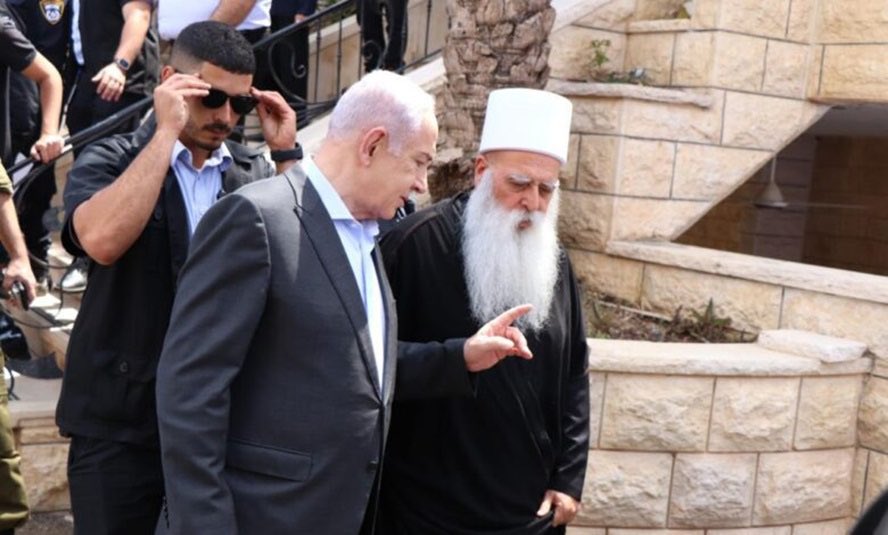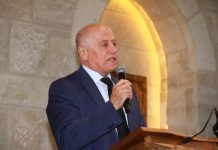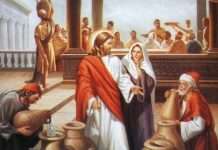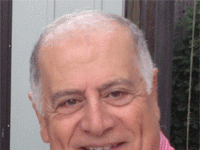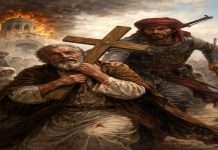A Thoughtful Perspective into the Massacres and Extermination Targeting the Druze in Sweida Driven by a Culture of Invasions, Hatred, and Rejection of the Other
Colonel Charbel Barakat/July 17/2025
قراءة في ما يتعرض له الدروز في السويداء من مجازر وابادة على خلفية ثقافة الغزوات والحقد ورفض الآخر
الكولونيل شربل بركات/17 تموز/2025
أخيرا اضطرت اسرائيل للتدخل لوقف المجازر التي بدأت في جبل العرب موطن دروز سوريا حيث بقي التعلق بالأرض وبالوطن مدعاة فخر لهؤلاء كما اخوتهم المتجذرون في تراب لبنان وجباله منذ ما قبل الأمارة والذين لا يهابون الموت في سبيل كرامتهم وعنفوانهم وكما اخوتهم في الجليل شمال اسرائيل الذين فضلوا التمسك بالتراب والتفاهم مع جيرانهم اليهود والبقاء في أرضهم والدفاع عنها جنبا إلى جنب على ذل التهجير والهرب وانتظار “التضامن” ومفاعيله.
الدروز هؤلاء كانوا قاوموا تعنت ابراهيم باشا والي مصر سنة 1584 الذي قرر تحميل أميرهم قرقماز مسؤولية سرقة أموال الميرة الذاهبة إلى اسطنبول والتي فقدت في منطقة عكار التي لم تكن من ضمن سيطرته ولكن الباشا قرر عدم الاستماع إلى العقلاء منهم الذين جاؤوا يومها لاستقباله وتقديم الطاعة وشرح بطلان التهم، لا بل قتل الوفد المؤلف من ستين من المشايخ واستمر بالهجوم على القرى الآمنة فكانت الحصيلة بحسب المؤرخين ستون ألفا وعلى راسهم الأمير قرقماز والد فخر الدين المعني الثاني الكبير.
اليوم وفي مدينة سلطان باشا الأطرش، الذي قاوم الفرنسيين سنة 1925 وباعتقاده أنه يدافع عن بلده سوريا، يقتل الدروز بدون رحمة وكأنهم لا ينتمون إلى هذه البلاد، لا بل يقود بعض المتغطرسين حربا عليهم بكل عتاد الجيوش وعديد المليشيات المؤدلجة بحسب نظريات التطرف الاخونجية التي، بالرغم من اعتراف دول العالم وعلى رأسها الولايات المتحدة بالنظام الجديد واعطائه فرصة لاثبات قدرته على التأقلم مع مسؤولية بناء دولة تعددية في سوريا، تحجّرت ضمن وهم التطرف وثقافة القهر التي لا تعرف غيرها ولو تبدلت الثياب وخفت اللحى. فجماعة مرسي التي حكمت مصر نالت اعتراف الكل بها قبل أن تبدأ بالتنكيل بالمصريين، لكن الشعب المصري ما لبث أن فهم لعبتهم سريعا فغير الوضع وأعاد تصنيفهم ارهابيين.
لم يكن لدولة اسرائيل خيار سوى التدخل بعد يومين من الهجمات والتعبئة الغير مبررة ونتائج دخول القتلة إلى عقر دار بني معروف حيث ظهرت حقيقة ثقافتهم الحاقدة وعدم معرفتهم بأصول التعامل مع الناس. وقد حذرت اسرائيل وأطلقت بعض التنبيهات، ولكن بطر “النصر” الذي اعتقد هؤلاء بأنهم نالوه غرّهم فلم يرعووا. ولم يتحمّل دروز اسرائيل رؤية اخوتهم يقتلون فدعوا للتحرك والدخول إلى سوريا لنجدتهم. عندئذ أضطرت الحكومة الاسرائيلية أن تقوم بواجباتها لحماية أبناء السويدا، بأن نفذت انذارها بقصف مقر رئاسة الأركان وقيادة الجيش لا بل وأيضا بالقرب من القصر الرئاسي لكي يتحرك الرئيس الشرع ويسحب القوات التي دخلت المدينة ويعيد احترام الاتفاق الذي كان ابرم مع المواطنين حول مشاركتهم بحماية منطقتهم من ضمن القوى الرسمية المولجة بالمهمة.
المشكل في كل ما جرى هو مواقف الجماهير العربية وبعض وسائل الاعلام التي خرجت عن اتزانها ووقعت بما وقعت فيه يوم الهجوم المضاد على غزة. فيومها كانت الجماهير تهلل لحماس وهجماتها الغير مبررة وقتلها لأكثر من ألف ومئتين من مواطني اسرائيل واختطاف ثلاث مئة بدون سبب سوى بث الحقد ونتائجه. ولم يسمع أحد ما قلناه يومها بأن هذا العرس سيكلّف الفلسطينيين أضعاف مضاعفة من القتلى، لأن انتقام المجروح بدون سبب سيكون عظيما، وهذا ما جرى بعد عشرين يوما على المجزرة ولم يتدخل أحد من العرب، حتى الذين تربطهم اتفاقيات سلام مع الدولة العبرية، لم نسمع بأن صحف مصر أو الأردن مثلا أو حتى دول الخليج قد دانت ما قامت به حماس أو طلبت منها اعادة المخطوفين. فبدأت اسرائيل هجومها المركز وكان ما كان ولا يزال مستمرا. وها هي الجماهير تسير بالوهج بمجرد أن سمعت عن تدخل اسرائيل بموضوع دروز جبل العرب، وهي لم تتدخل يوم مقتل العلويين بالرغم من الجرائم التي ارتكبت.
ونحن لا نؤيد جماعة الأسد وما قاموا به، ولكننا لا يمكن أن نؤيد قتل الناس بسبب هويتهم أو انتمائهم، إن كانوا علويين أو سنة أو دروز أو مسيحيين أو شيعة أو يهود لا فرق. وقد يكون هذا ما يخيف الأكراد من تسليم اسلحتهم. فلا يمكن أن تأمن لهذه المليشيات العقائدية لتكون هي الحكم بين الناس، وكان على الرئيس الشرع أن يعي بأن الأمور لا يمكن أن تسير بهذه السرعة، ولن يستطيع السيطرة على الأرض طالما يعتمد على قوى من لون واحد في منطقة متعددة الألوان، فهذه يلزمها اعادة تأهيل والتعود على القبول بالغير المختلف.
ولذا يطالب العالم حزب الله في لبنان بتسليم أسلحته للدولة والعودة إلى حمايتها مثل بقية مركبات الوطن لأن الفئة المؤدلجة لا يمكنها أن تسيطر على غيرها وتؤمن الاستقرار، وهي يلزمها اعادة تأهيل ولا أحد يملك ترف الوقت لتأمين اعادة التأهيل في ظل السلاح. ومن هنا ضرورة القبول بالتساوي مع بقية المواطنين، فالدولة قائمة والجيش قادر أن يحمي. وما تقوم به اسرائيل هو لكي يقتنع الحزب بضرورة التساوي مع بقية اللبنانيين فيقبل بالتخلي عن السلاح وحل المشكل بالتفاوض للوصول إلى سلام واستقرار عبر الحدود.
أما أن تتحكم ثقافة الحقد القاتلة بمستقبل الشعوب والدول فذلك لن يوصل أحد إلى الاستقرار ولا الازدهار. والتعبئة التي مارستها الاحزاب العقائدية من مثل الحرس الثوري ومشتقاته وحركة الاخوان المسلمين وافرازاتها لا يمكن أن تعد الناس بمستقبل كريم. فهل سننتهي من التعصب الأعمى ونظريات التقاتل ونصل إلى شرق أوسط جديد يحلم بالاستقرار والسلام والتعاون البناء؟.
A Thoughtful Perspective into the Massacres and Extermination Targeting the Druze in Sweida Driven by a Culture of Invasions, Hatred, and Rejection of the Other
Colonel Charbel Barakat/July 17/2025
LCCC Editor’s Introduction
In this powerful commentary, Colonel Charbel Barakat, a renowned expert in Middle Eastern affairs, sheds light on the massacres and attempts at extermination faced by the Druze community in Sweida, Syria. He attributes these atrocities to a persistent Stone Age mentality—a culture of invasion, hatred, and rejection of the other—that continues to plague the region.
Israel’s Intervention and the Druze’s Historic Resilience
Israel was ultimately forced to intervene to halt the massacres unfolding in Jabal al-Arab, the historic homeland of the Syrian Druze. Like their brethren in Lebanon—who have been rooted in its mountains since before the Emirate era—and their kin in northern Israel, the Druze of Sweida are deeply attached to their land and national identity. They are proud and unafraid of death when defending their dignity and honor.
The Druze of northern Israel, in particular, chose to remain steadfast on their land, to coexist with their Jewish neighbors, and to defend their homeland shoulder to shoulder—rather than submit to displacement and humiliation, waiting in vain for empty gestures of “solidarity.” This is not the first time the Druze have confronted oppression. In 1584, they resisted the aggression of Egypt’s Ottoman governor, Ibrahim Pasha, who falsely blamed their Emir, Qorkmaz, for the disappearance of supplies en route to Istanbul—despite the fact that the incident occurred in Akkar, a region outside his control. When sixty Druze elders came to meet him in goodwill and explain the truth, Pasha had them executed and launched a brutal assault on peaceful villages. According to historians, the resulting death toll reached 60,000, including Emir Qorkmaz, the father of the renowned Emir Fakhreddin II.
History Repeating Itself: Ideological War in the City of a Hero
Today, in the very city named after Sultan Pasha al-Atrash—the hero of the 1925 anti-colonial revolt against the French—Druze are being slaughtered mercilessly, as though they are strangers in their own land. Extremist forces, equipped with military hardware and backed by ideologically driven militias inspired by Muslim Brotherhood-style fundamentalism, have launched a full-scale assault. This, despite the fact that the international community—led by the United States—has recognized the new Syrian regime and given it a chance to prove it can build a pluralistic state. Yet, instead of reform, the regime and its affiliates remain entrenched in a delusional ideology of extremism and repression. Their appearance may change—shorter beards, modern language—but their mentality is still rooted in tyranny and exclusion. We saw this with the Morsi regime in Egypt, which was recognized by the world before quickly revealing its true face through oppression. The Egyptian people soon understood the deception and reclassified them as terrorists.
The Israeli Response: A Last Resort
Israel had no choice but to act. After two days of unprovoked mobilization and bloody incursions by these extremists into Druze homes, the truth about their hateful mindset became clear. Israel had issued warnings, hoping to prevent escalation—but the aggressors, intoxicated by an imagined “victory,” refused to back down. Israeli Druze, devastated by the killing of their brothers in Sweida, called for urgent action. The Israeli government, fulfilling its duty to protect lives, responded by striking military headquarters, including targets near the presidential palace in Damascus. This decisive action forced the Syrian president to pull back forces from Sweida and honor a prior agreement, allowing local citizens to protect their region under the banner of state-sanctioned security forces.
The Real Scandal: Arab Public Opinion and Media Bias
The real problem lies in the hypocritical reaction of Arab masses and certain media outlets—just as occurred during the Gaza counteroffensive. When Hamas launched its October attack, killing over 1,200 Israeli civilians and abducting 300 innocents without cause, many in the Arab world erupted in celebration. Few heeded the warnings that such bloodshed would unleash a devastating Israeli response. And when it came, not a single Arab government— not even those with peace treaties with Israel—condemned Hamas or demanded the return of the hostages. There was no statement from Egypt, no outcry from Jordan, no editorial in the Gulf press. Israel responded with force, and the campaign continues to this day. Yet now, these same voices are in uproar over Israel’s limited intervention to protect the Druze in Jabal al-Arab—despite remaining silent during atrocities committed against Alawites and others.
Rejecting Sectarian Violence—For All
We do not support the Assad regime or its actions. But neither can we endorse the killing of people based solely on their religious or ethnic identity—be they Alawites, Sunnis, Druze, Christians, Shiites, or Jews. This fundamental principle of justice is likely what deters the Syrian Kurds from disarming: how can anyone trust ideologically driven militias to serve as fair rulers or protectors? We believe strongly that the Syrian president must recognize that lasting control over Syria cannot be achieved by relying on one monolithic group in a country defined by its diversity. Real stability demands national reconciliation, reeducation, and the acceptance of those who are different.
Lebanon: A Lesson Waiting to Be Learned
The same lesson applies to Lebanon. The world is increasingly demanding that Hezbollah disarm and reintegrate into the national structure under the protection of the state, like all other factions. No ideological militia can dominate others and maintain long-term stability. Rehabilitation is needed—but this cannot happen while Hezbollah retains its weapons. This is why Israel’s recent pressure on Hezbollah aims to persuade it of the necessity of equality with other Lebanese. It must abandon its arms and resolve disputes through negotiation—for the sake of peace and stability within Lebanon and across its borders.
The Future: Stability or Fanaticism?
A culture of hatred and violent fanaticism cannot shape the future of nations and expect prosperity. The ideological mobilization promoted by the Revolutionary Guard, Hezbollah, the Muslim Brotherhood, and their affiliates offers only ruin. The question is, will the Middle East region finally abandon blind extremism and the poisonous doctrines of perpetual warfare and wisely take the first steps toward building a new Middle East—one that dreams of peace, stability, and meaningful cooperation among all its peoples?
Colonel Charbel Barakat
***Colonel Charbel Barakat, a retired Lebanese Army officer, historian, terrorism expert, and author of numerous works on Lebanon, the Iranian regime’s schemes, and jihadist movements, has testified multiple times before the U.S. Congress on critical issues, including Iranian and Syrian terrorism, the Syrian occupation of Lebanon, jihadist threats, and the pursuit of Middle East peace.
السيرة الذاتية للكولونيل شربل بركات
خبير عسكري، كاتب، شاعر، مؤرخ، ومعلق سياسي
*ضابط متقاعد من الجيش اللبناني
*متخرج من المدرسة الحربية ومجاز بالعلوم السياسية والادارية من الجامعة اللبنانية
*كلف كأحد الضباط لتنظيم الدفاع عن القرى الحدودية منذ 1976
*تسلم قيادة تجمعات الجنوب
*تسلم قيادة القطاع الغربي في جيش لبنان الحر وأصبح مساعدا للرائد سعد حداد ثم تسلم قيادة الجيش بالوكالة عندما مرض الرائد حداد واستمر بعد وفاته حتى مجيء اللواء أنطوان لحد فأصبح مساعده ثم قائدا للواء الغربي في جيش لبنان الجنوبي
*ترك العمل العسكري في 1988 وتسلم العلاقات الخارجية
*شهد أمام لجنة العلاقات الخارجية في مجلس الشيوخ الأميركي مرتين
*كاتب سياسي وباحث في التاريخ له الكثير من الكتب والمقالات السياسية التاريخية والانسانية
نشر كتابه الأول “مداميك” (1999) الذي يحكي عن المنطقة الحدودية ومعاناة أهلها، ترجم إلى العبرية ونشرته معاريف (2001) والانكليزية (2012) Madameek – Courses – A struggle for Peace in a zone of war موجود على Amazon Books
*نشر كتابه الثاني “الجنوب جرحنا وشفانا” الذي يشرح الأحداث التي جرت في المنطقة بين 1976 – 1986
*الكتاب الثالث “Our Heritage” كتاب بالانكليزية يلخص التراث اللبناني مع رسومات لزيادة الاستيعاب موجه للشباب المغترب
*كتابه السياسي الثالث “لبنان الذي نهوى” (2022) جاهز للطبع
*كتاب مجزرة عين إبل 1920 وهو بحث تاريخي عن المجزرة التي ساهمت في نشوء وتثبيت لبنان الكبير
*كتاب “المقالات السياسية 2005 – 2013” مئة ومقالة منشور على صفحته
*كتاب “الشرق الأوسط في المخاض العسير” مجموعة مقالات سياسية (2013 – 2025)
*كتاب “العودة إلى عين إبل” بحث تاريخي بشكل قصصي عن تاريخ المنطقة بين 1600 – 1900
*كتاب شعر عن المعاناة خلال الحرب الكبرى 1914 – 1918 من خلال قصيدة زجلية نقدية جاهز للطبع
*كتاب “تاريخ فناء صور الخلفي” بحث تاريخي عن المنطقة الجنوبية – قيد الانجاز
*كتاب المقالات الانسانية وكتاب عينبليات قيد الانجاز
















